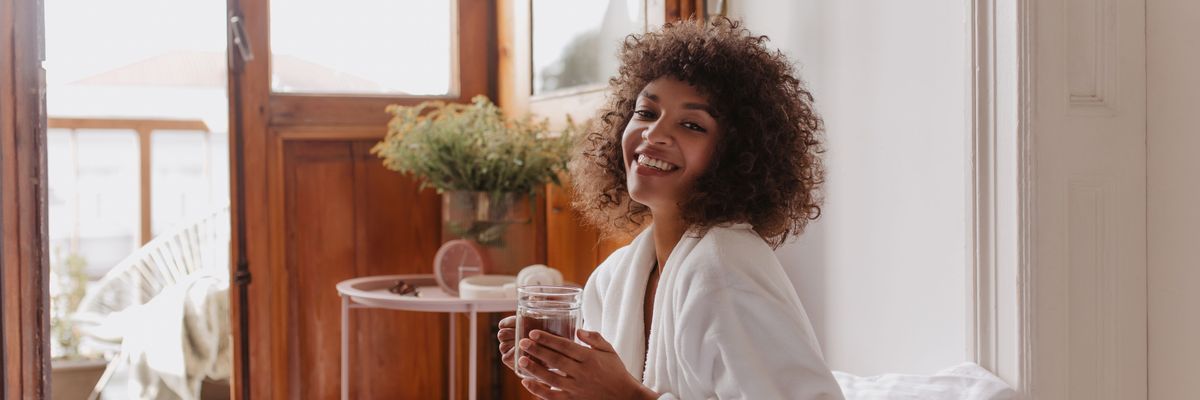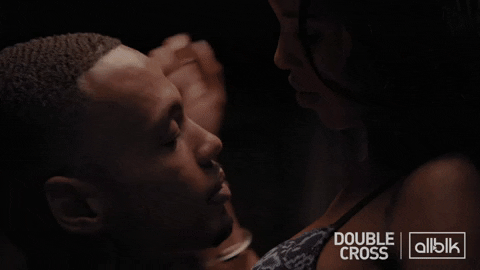
A couple of weeks ago, as I attempted to listen to the radio (throwback music fans can read between the lines there; some of this music these days is violating as hell), it was like the universe was begging me to pen this article. First, it was Lilo Thomas’s “Wanna Make Love (All Night Long).” Then it was Boyz II Men’s “I’ll Make Love to You” (question: why I gotta throw my clothes on the floor when he’s gonna gently take his off?). Then it was (and this is my jam — but still) Lorenzo’s “Make Love to Me” (yes, I finally went to a throwback station to get all of this). And while one part of me had my head and neck swaying from left to right, another part of me was low-key irritated…like I almost always am…whenever I hear the phrase “make love.”
Sex. As making love. What in the world? I mean, if only married (or folks in long-term committed relationships…and I do mean more than just three months) were saying it, I could kind of get it. Okay, but you’ve been seeing someone, and after a few days, y’all have sex, and you say that he made love to you? How is that even possible? In the immortal words of NeNe Leakes, I feel like when love is tossed around so casually like that, it’s somewhere asking, “Now, why am I in it?”
Yeah…we’re gonna go there today. And while I totally get that this is my opinion, not everyone will agree, and there will be some pushback, please just entertain why, when it comes to describing a sexual experience, “make love,” more times than not (at least these days), is not the responsible depiction of what’s actually going on.
Where Did the Phrase “Make Love” Even Come From?
 Giphy
GiphyOkay, so before we get into why I feel so strongly about “make love” as I do, let’s look into its origin story because I promise you that I have wondered, for years now, who even came up with the concept. I did some digging, and the closest thing that I could find is an English writer by the name of John Lyly, who once penned a piece called How To Make Love to the Moon: Intimacy and Erotic Distance, seemingly around 1590 — and he wasn’t talking about sex at all. He was actually referencing romance and courtship. Oh, but by the 20th century, it was used a bit more broadly, and then by the 1940s, it had become the slang term that it is now.
So, let’s start there, shall we? Initially, "make (produce) love (deep affection)" had nothing to do with the bedroom at all. It was about doing things to bring two people closer together on a mental and emotional level. Sex was so not the agenda.
Now bookmark that, please, as we move right along.
Why 'Make Love' Is One of the Most Irresponsible Phrases Around
 Giphy
GiphyI already know. Some of y’all are gonna say, “So, are you saying that sex doesn’t produce deep affection?” It can. It most certainly can. My pushback would be that casual sex doesn’t do that, though. I mean, the mere definition of casual includes things like “without definite or serious intention; careless or offhand; passing” — so if no one is seriously intending for anything more than getting off to happen, if they are actually making moves that by, direct definition, are careless (listen, I’m just breaking the words down) — how could any real affection come from that? Because, for the record, affection means “fond attachment, devotion, or love.”
How can someone be casually devoted or casually love you? THEY CAN’T — and yes, I am yelling it. Devotion and love are very intentional. Extremely so.
And for the people in the back who still are rolling their eyes at your monitor or cell phone screen because you’re like, “There have been times when I have felt extremely attached or devoted to someone who I had a casual experience with. Hell, sometimes I even felt like I loved them” — well, I really wish that one day all of us will take oxytocin highs literally and seriously. Yes, there is a hormone in your body that is designed to bond you to the people you sleep with; however, that speaks to a physical response far more than an emotional dynamic…and that’s just what trips a lot of people up: they don’t know the difference between the two.
Okay, but what if you are in something that isn’t casual? What then? I’ll say this: I once penned a piece for the site entitled, “Make-Up Sex Might Be Doing Your Relationship More Harm Than Good.” The thing that you have to be careful of is using sex as a deflection from real issues that need to be addressed and then calling it “making love” to make you feel better about doing it. Because think about it — if you keep telling yourself that whatever the two of you are going through “isn’t so bad” because you just made love last night…do you get how deceptive that can (potentially) be?
Case in point. I know someone who is going through a divorce who said that because the sex with their spouse was so good, they would confuse great sex with a healthy relationship…yes, even in marriage. And because of that, they never really got to the root of their issues…which only made the problems and challenges worse. The worse they felt, the more sex they would have and the more they would justify staying…due to the sex.
Listen, no one said that sex isn’t mighty powerful. In fact, I’m the one who will stand on the highest hilltop and yell that it is with the biggest bullhorn. That’s why it needs to be approached from a responsible space and mindset — which is why, when it comes to the act, I have my own motto, one that puts “make love” into, what I believe is its proper place.
Sex Does Not "Make" Love; Sex CELEBRATES Love
 Giphy
GiphyI’m aging myself. Plus, as pro-Black as I am and as triggered as I would sometimes get by just how WHITE the original Beverly Hills, 90210 was, I was still a fan. Hell, in college, my late fiancé and I would even sometimes watch it together. And a classic episode was when Brandon Walsh’s girlfriend, Emily Valentine, slipped him euphoria; he got mad, and she told him that if they made love, he wouldn’t be mad anymore. What he said in response was a checkmate for the ages: “In order to make love, I have to be in love.”
Yeah, Brandon was preachin’ right there. I mean, how many times have you watched a movie or TV show where two people have been having consistent sex and then, when one of them says, “I love you,” the other one will be semi-freaking out, talking about “It’s too soon to say that.” So…it’s too soon for someone to declare their love to you even though they are out here making love to you? Make it make sense, y’all. If love is what sex is making, shouldn’t love be produced after a couple of times?
Are y’all starting to see more of my point?
It is my personal belief that a lot of people feel uneasy about “love” being used too soon because, deep down, they know that making love isn’t what they are doing. Getting to know someone better. Enjoying their time. Sharing orgasms with someone who can get them there. Sure. LOVING THEM? Sex producing love? Nah. And that’s why I firmly believe that sex doesn’t make love; sex CELEBRATES love. Because if you don’t love someone outside of the bedroom, sex isn’t gonna make that happen…, and if you do, sex is simply a physical manifestation of a deep and profound feeling and decision (with actions in place that totally back it up) that already exists.
Just ask some long-term committed couples that you know if sex is what “makes them” love their partner vs. sex being something that they used to celebrate — proclaim, rejoice in, honor, praise, revere, revel in, bless — that has already been established. And gee, when you look at all of the definitions (and synonyms) of celebrate, doesn’t it make sense that sex should be seen through the lens of celebrating love rather than making it?
Because if you truly value love, if you esteem it as special and sacred, sex would be honoring, revering, and blessing the bond between two people who care about each other, far beyond the surface level — two people who are committed, who have been through some things, we have made some compromises and sacrifices…two people who love each other in the purest and most accurate kind of way.
This brings me to my next point.
Please Don’t Expect Sex to Do Love’s Job
 Giphy
GiphyAbout a year ago, someone asked me what I thought was the biggest mistake that women can make when it comes to sex with a new partner. There are several, yet the one that immediately came to mind was, “Please don’t ask a guy if he loves you during the act. What guy would say ‘no’?”
This isn’t rocket science, and a lot of women know it. So, why do they do it? Honestly, it’s a form of manipulation, whether they realize it or not, because they are using a very vulnerable moment, where folks are usually not thinking very clearly, to have a serious conversation. Then, if a man says “yes,” they hold them to it as if it’s the gospel. Out here, expecting sex to do love’s job is reckless and emotionally dangerous.
And that’s the reason one billion why “make love” irks me so. I’ll explain deeper. Because I am both a marriage life coach and a doula, sometimes “the lanes” cross. When a couple is in trouble, sometimes they will tell me that they think having a baby will make things better. A child is not meant to be anyone’s savior. And you know what? Neither is the act that gets them here (funny how that plays out) — sex.
Sex is not supposed to be expected to do love’s job because love is a HUGE responsibility. Being patient with someone? Constantly encouraging and supporting someone? Being steadfast in trying times? Honoring your word? Allowing reason to override emotion, so that you can make responsible and accountable decisions for the sake of your relationship? You expect love to make all of that happen for you? In what universe?
I promise you, the more that I have spent time pondering all of this, the more “make love” is something that I almost wish would go away. For those of you who actually love each other (mutually so), CELEBRATE LOVE all you want. Sex producing love? It’s just never gonna sit well with me. Love is too awesome, and "producing it" is not sex’s responsibility.
This brings me to my final point.
If Love Is Cake, Sex Is Icing (and Kinda-Sorta Barely That)
 Giphy
GiphyAn ex of mine from back in the day, used to say all the time that if you need condiments to make your food taste right, it wasn’t prepared well in the first place. Now, if you paid attention to the title of this last section, I’m pretty sure that you can see where I am going with this.
My favorite cake is very specific: It’s Red Lobster’s chocolate cake (sidebar: did you know that the founder of Red Lobster stood up to Jim Crow laws back in the day?). Hell, I don’t even eat shellfish yet I’ll get some cake from that spot. Anyway, the icing is cool, but if one day I went there and the cake didn’t have any icing on it, I’d still eat it — that’s just how good the cake is. Oh, but on the other hand, if all they had was icing, I would take a hard pass. Too much icing can be overkill. Too much icing, without cake, can make you sick.
See what I’m saying? When it comes to cake and icing, I see love as “cake” and sex as “icing.” Icing can make the cake so much sweeter and enjoyable, yet if there was no cake…what’s icing’s freakin’ point at all? Icing is literally designed to accentuate/amplify something that already exists. It needs the cake far more than the cake needs it.
And for those who got through all of this and are still wanting to “But what if…” what I’m saying — listen, I write about sex too damn much on this platform for y’all to think that I don’t know that sex has layers to it. All that I’m addressing today is why I wholeheartedly believe that “make love” really needs to be used less. Honestly, I wouldn’t lose a bit of sleep if it got retired altogether. If you’re not in love, or in a mutually loving situation (because the two are not exactly the same), why not say what you’re actually doing: you’re having sex? It’s a way to keep you from programming your mind to make the reality of what is happening more than it is.
And if you are in love (or mutually love), give yourself more credit: sex is not producing love…sex is BLESSING the love that you and your partner have worked so hard to establish.
_____
Aight. I don’t know how to drive this point home more than I just have. I think now I will listen to a true classic R&B song that totally cosigns on my point — what y’all know about Peabo Bryson and Roberta Flack’s “Tonight, I CELEBRATE My Love for You”?
Yeah, that’s what I’m talking about. Good, real stuff right there.
Celebrating what’s ALREADY BEEN made. Excellent.
Let’s make things inbox official! Sign up for the xoNecole newsletter for daily love, wellness, career, and exclusive content delivered straight to your inbox.
Featured image by Giphy
This Is How To Keep 'Holiday Season Stress' From Infecting Your Relationship
Hmph. Maybe it’s just me, but it seems like there is something really weird happening in the fall season air (because winter doesn’t officially begin until December 21) that cuddle season is in full swing while break-up season is as well. In fact, did you know that break-ups are so popular during the holiday season that December 11 is deemed Break-Up Day?
The reasons why relationships shift around this time vary; however, I did both roll my eyes and chuckle when I read that a very popular one is because it’s an easy way to get out of getting one’s significant other a Christmas present. SMDH.
Anyway, I personally think that the less shallow folks out here may contemplate calling things “quits” or they at least distance themselves a bit from their partner (and what I’m referring to is serious relationships) due to all of the stress and strain that oftentimes comes with the holidays whether it be financial, familial, due to their tight schedules or something else.
Listen, I would hate for you and your man to miss the fun and happiness of experiencing this time of year, all because you are so overwhelmed or irritated that you can’t really enjoy it. That’s why I have a few practical tips for how to avoid allowing the typical holiday season stress from INFECTING your relationship.
Manage Your Expectations
 Giphy
GiphyUnmanaged expectations. If there is a main reason why the holiday season tends to be so stress-filled for so many people, I’d bet good money that this is the cause. And when you’re in a long-term relationship, expectations can manifest themselves in all sorts of cryptic and/or unexpected ways. You might have relatives who assume that you are going to be with them for Thanksgiving or Christmas when you have other plans in mind. You might be thinking that you are going to spend one amount for presents while your man is thinking something totally different. When it comes to scheduling, your signals may be crossed.
And you know what? To all of these scenarios, this is where clear and consistent communication come in. Don’t assume anything. Don’t dictate anything either. From now until New Year’s, mutually decide to check in once a week, just to make sure that you are both on the same page as it relates to the holidays and what you both are thinking will come along with it. The less blindsided you both feel, the less stressed out you will be. Trust me on this.
Set (and Keep) a Budget
 Giphy
GiphyOkay, so I read that last year, 36 percent of Americans incurred some type of holiday-related debt. Hmph. Last year, there was still some sense of normalcy in this country, chile, so I can only imagine what finances are gonna look like over the next several weeks. That said, since I don’t know a lot of people who don’t find being broke stressful, make sure that you and your bae set a budget and then stick to it this year — no ifs, ands or buts.
Because really, y’all — it doesn’t make sense to deplete savings and/or max out credit cards for a few days of giggles only to be damn near losing your mind because you don’t know how to make ends meet come Dr. Martin Luther King, Jr. Day.
And by the way, this tip doesn’t just speak to things like food and gifts; I also mean travel. If it doesn’t make a ton of sense (or cents) to be all over the place this year — DON’T BE.
Keep Matthew 5:37 at the Forefront
 Giphy
GiphyIf off the top of your head, you don’t know what Matthew 5:37 says, no worries, here ya go: “But let your ‘Yes’ be ‘Yes,’ and your ‘No,’ ‘No.’ For whatever is more than these is from the evil one.” That verse right there? Oh, it’s a boundaries lifesaver! I say that because do you see “maybe” or “I’ll think about it” in there? Nope. LOL. It says that you should tell people “yes” or “no” and leave it at that — and that complements Anne Lamott’s quote, “’No’ is a complete sentence” impeccably well. Yeah, you’ve got to remember that anything beyond a yes or no to a request is privileged information; you don’t owe anyone details or an explanation.
Besides, if you are really honest with yourself, when someone asks you something and you give a “Umm, let me think about it” kind of reply, more times than not, you already know what your answer is going to be — so why not let you both off of the hook? Give your response. Commit to that. And let everyone (including yourself) get on with their lives and schedules.
I promise you that when it comes to those holiday parties, you are pissing more folks off by not RSVP’ing or doing so and not showing up than just saying, “Thank you but not this year” off the rip.
Remember That Your Personal Space Is Privilege Not a Right
 Giphy
GiphyA friend of mine recently bought a new house and invited me over to come see it. He’s a single man with no children, so as I was taking in all of the space that he had, especially as I walked through his finished basement, I joked about relatives coming to live with him. “Hell no” and “absolutely not” were pretty much his immediate responses as he went on to say that some folks even had the nerve to be offended when he told them that he had no intentions on taking DNA in.
Ain’t it wild how people think that your stuff is their right? And yes, that brings me to my next point. Your home is your sanctuary space. If you want to host folks this year — cool. If not, ALSO COOL. Please don’t let folks (family included) guilt you into how they want you to act or even into what they would do if the shoe was on the other foot. You are not them — and as one of my favorite quotes states, “If two people were exactly alike, one of them would be unnecessary.” (A man by the name Larry Dixon said that.)
Hell, my friends? They know that I am good for sending them random things that they need or even want all throughout the year. Coming over to hang out at my pace, though. Uh-uh. Chalk it up to being a card-carrying member of the ambivert club yet I like keeping my living space personal — and I sleep like a baby, each and every night, for feeling that way.
Always remember that your space, your time, your resources, your energy and shoot, yourself period (including your relationship), are all things that are your own. You get to choose how, when and why you want to share them. The holiday season is certainly no exception.
Cultivate Some “You Two Only” Traditions
 Giphy
GiphyIt’s not uncommon for some couples to hit me up after the holiday season to “detox.” Sometimes it’s due to the financial drama (and sometimes trauma) that they experienced. Sometimes it’s because they allowed their relatives (especially in-laws) to get more into their personal business than they should’ve. More than anything, though, it tends to be because they didn’t get enough quality time together and so ended up feeling “disconnected.”
Please don’t let that happen. Listen, I’m not even a holidays kind of woman and yet, I will absolutely sit myself down with some hot chocolate and chocolate chip cookies to enjoy a Hallmark holiday film or two. Aside from the fact that most of them are lighthearted and sweet, I also like that they usually focus on couples loving on each other amidst all of the holiday beauty and ambiance — which is something that all couples should set aside some time to do.
Maybe it’s a vacation. Maybe it’s a staycation. Or maybe it’s my personal favorite, A SEXCATION. Whether it’s for a few days, the weekend or even overnight — don’t you let the holidays go by without setting aside time for you and your man to celebrate one another. Don’t you dare (check out “Are You Ready To Have Some Very Merry 'Christmas Sex'?”).
GET. SOME. REST.
 Giphy
GiphyI once read that 8 out of 10 people get stressed out over the holidays and 3 out of 10 lose sleep during to it — and when you’re stress-filled and sleep-deprived, that can absolutely lead to hypersensitivity, making mountains out of molehills and even not being in the mood for sex.
Your relationship can’t afford to go through any of this, so definitely make sure to prioritize rest. I don’t care how unrealistic it might seem during this time, sleep should never be seen as a luxury; it will always and forever be a great necessity.
That said, try to get no less than six hours of shut-eye in (check out “6 Fascinating Ways Sex And Sleep Definitely Go Hand In Hand”) and even ask your bae to take a nap with you sometimes (check out “Wanna Have Some Next-Level Sex? Take A Nap, Sis.”). Not only will sleep help to restore your mind, body and spirit but, when it’s with your partner, it’s an act of intimacy that can make you both feel super connected, even in the midst of what might feel like chaos.
___
Holiday season stress is real. Still, never give it the permission or power to throw your relationship off. Put you and your man first and let the holidays be what they are gonna be, chile.
Let’s make things inbox official! Sign up for the xoNecole newsletter for love, wellness, career, and exclusive content delivered straight to your inbox.
Featured image by Shutterstock
Whew. Did you know that somewhere around 122 million Americans travel during the holiday season? Listen, I went to see my godbabies this past September and got caught up in a crazy ass traffic jam at BNA (the Nashville airport) that damn near has me considering air travel ever again — especially during this time of the year.
Besides, it’s not like it’s a written rule that you have to travel over the holidays. In fact, if you want to play it chill this year, why not enjoy a staycation instead? Although it might seem like it’s a “poor man’s compromise,” as you’re about to see, it actually…isn’t.
1. Go All Out with the Christmas Décor
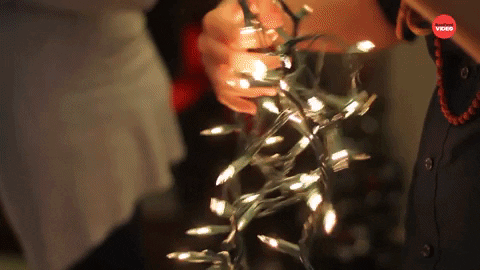 Giphy
GiphyThere is someone I know who is so obsessed with Christmas, she’s damn near annoying-borderline-terrifying. I’m. Not. Kidding. Yet hey, if you’re going to do a holiday-themed staycation (emphasis on “holiday-themed”), that’s kind of how you’ve got to be. Some décor ideas include:
- A fresh Christmas tree (is the most ideal) that is ultimately decorated
- Wreaths on outside and inside doors
- Garland (with twinkle lights) in predictable and unpredictable places
- Poinsettias
- Mistletoes
- Snow globes
- A stocking (with some of your favorite things in it)
- Fake snow
- Stars
- Angels
- Candy canes
- A BLACK Santa (LOL)
I mean, since you are going to be spending a lot of time at home, it can feel like a mini-winter wonderland if you are intentional about doing more decorating to your living space than you ever have before!
2. Buy a Couple of Christmas-Themed PJs
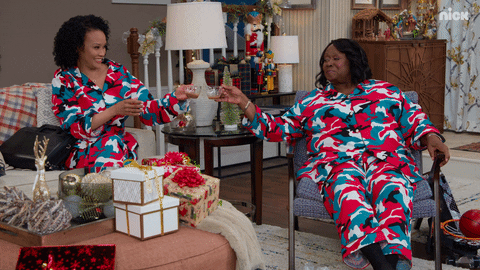 Giphy
GiphyWhile I was doing some research on a totally different topic, I happened upon an article that talked about the psychology behind why we should be intentional about what we wear to bed. When you stop to think about the fact that (hopefully) you are sleeping somewhere between 6-8 hours every night, it would make sense that things like the color and fabric of your sleepwear would have a real impact on you — even subconsciously.
Well, when it comes to Christmas décor, specifically, not only does it take you back to nostalgic memories, it can also boost your moods. So, aside from being on-10 with your Christmas décor, also invest in some Christmas-themed PJs. Since you’re going to be doing a lot of lounging around (RIGHT?), do it in something that makes you think about all of your favorite things about this time of year.
3. Cop Some Christmas-Scented Candles
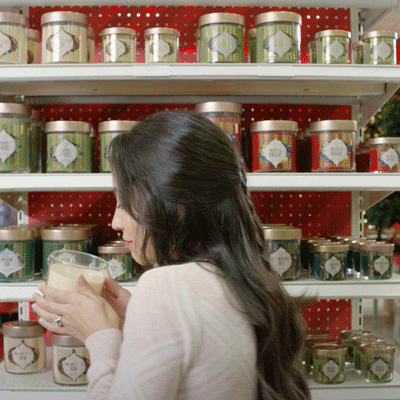 Giphy
GiphyThere really is no telling how many articles that I’ve written where I am singing the praises of scented soy candles. Candles are soothing, comforting and a very easy way to reduce stress. Also, since it gets darker quicker and for a longer period of time around this time of the year, candles provide a relaxing vibe to your home. Since it is Christmastime, go with scents that are reminiscent of the season:
- Cinnamon
- Vanilla
- Cranberry
- Apple
- Pine
- Frankincense and Myrrh
- Peppermint
- Cashmere
- Ginger(bread)
- Orange
- Sugar Cookies
- Sandalwood
- Cloves
- Cedarwood
- (Hot) Chocolate
Personally, one of my favorite candle companies is Goose Creek. Their signature collections will have your entire house smelling like a high-end bakery. No exaggeration.
4. Play Some Winter-Themed ASMR Sounds
 Giphy
GiphyI’m from Nebraska and my mother was a New Yorker. So, if there is one thing that I like, it’s seasons and that includes snow during wintertime. Unfortunately, Nashville is cray-cray when it comes to that. If, where you live, the weather is all over the place too (which is why I think it’s insane that some people still give pushback to global warming) and you would like for it to at least seem like you are in your own winter wonderland — invest in some fake snow to strategically place around your home.
Oh, and don’t forget to turn on some winter-themed ASMR sounds too. YouTube has videos that run for hours on end that feature blizzards and howling winds that really can make you feel like you are in the midst of an ice storm.
5. Host a Holiday Movie Marathon
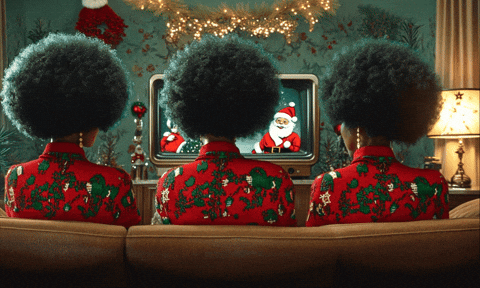 Giphy
GiphyOne thing to remember about a staycation is it doesn’t mean that you have to be alone or that the only people who can participate are the ones who live with you. Since a staycation is simply about staying close to home instead of traveling afar — absolutely consider having some of your favorite people over for a holiday-themed movie marathon. Shoot, Black America Web even did you a solid by publishing “25 Best Black Christmas Movies Of All Time;” plus, Tubi has a Black holiday hits section of indie films too.
Oh, and make sure to get creative with the Christmas-themed snacks. Some ideas? Some Kentucky-fried turkey tenders with cranberry hot sauce (recipe here), some Holiday Hot Spinach Dip (recipe here), some Grinch Kabobs (recipe here), some roasted pecans (recipe here) and some Pomegranate Guacamole (recipe here).
6. Spend a Night (or Two) at a Hotel or Vacation House
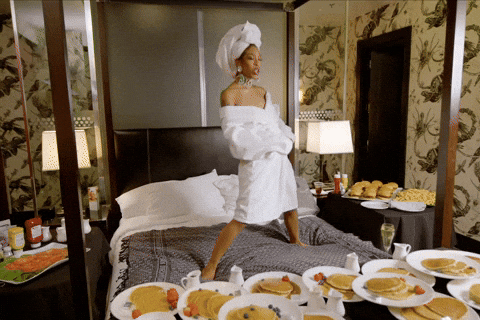 Giphy
GiphyJust like you don’t have to be alone during a staycation, you also don’t have to be cooped up in your house the entire time. Get a change of scenery in your own city by spending the night in a hotel that you’ve always wanted to try out or renting a vacation house for you and some of your folks to hang out in during the time between Christmas and New Year’s Day. I have a “love little sister” who does this randomly when she needs a break from her work as a therapist. She says that it’s damn near like taking a trip (and she has PLENTY of passport stamps; trust me).
7. Have Brunch or Dinner at a Christmas-Themed Restaurant
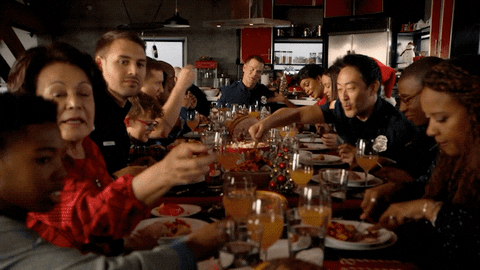 Giphy
GiphyIf nothing puts a bigger smile on your face than the thought of DoorDashing meals and barely even touching your stove during your staycation — hey, I am right there with you. Do consider going out to brunch or dinner during your chill time, though. It’s another way to bond with people and create some current holiday memories. And if you’ve got a bae and you opt for dinner, it can be a wonderful type of Christmas-themed date.
8. Go to a Holiday-Themed Concert
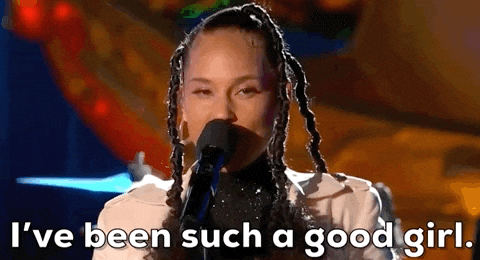 Giphy
GiphyBeing that I got my start as an entertainment writer, hear me when I say that I’m not someone who just has to go to a live concert every chance that I get. Oh, but baby, when I saw that El DeBarge was doing a City Winery tour and he was going to be here right before Christmas — I booked myself a ticket quick, fast and in a super-duper hurry! Shoot, I didn’t even want to go with someone because I plan to give him and that falsetto voice of his my complete and undivided attention. LOL.
I don’t know what it is about the holiday season that makes live music that much more enjoyable — but if there is a concert that features one of your favorite artists happening right through here, consider that to be a cool way to “tour your city” while cultivating a really awesome memory at the same time.
9. Also, Go Ice Skating
 Giphy
GiphyOne of my fondest memories of time with my father is going ice skating. We actually would do it in the summer (because that is when I would visit him) and, every year, he would get me a new ice skating outfit. Even now, when I watch someone ice skate (even in movies; like in the classic movie Garden State), I will have warm fuzzies.
Anyway, if you’ve never been before, go. If it’s been forever since you have, also go. There is something that is very sweet and so signature Christmas about it. Plus, it’s a top-tier form of exercise.
10. Take a Christmas Lights Tour
 Giphy
GiphyAnother one of my favorite Christmas memories is driving through neighborhoods and looking at the Christmas lights. And just like a Christmas concert can be a form of hometown touring, so can doing this if you decide to choose a couple of areas where you’ve never really been or rarely frequent.
Now are you excited about the thought of experiencing a holiday-themed staycation?
I thought you would be. ENJOY!
Featured image by Shutterstock









